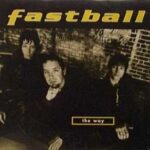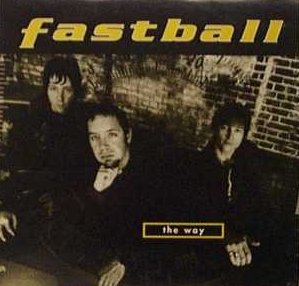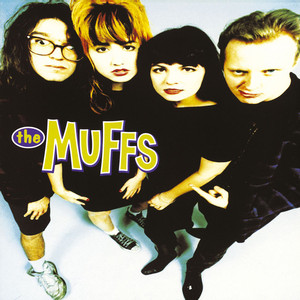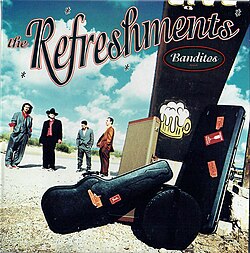 There’s something about the open road that has always captivated the American imagination. It’s a recurring theme in everything from Easy Rider to Springsteen’s Born to Run—that idea of just leaving it all behind, chasing freedom, escaping the mundane, or maybe running from yourself. In 1998, Fastball distilled that longing, mystery, and melancholy into one perfect song: “The Way.” It wasn’t just another radio hit—it was a mirage shimmering in the desert, a snapshot of rebellion disguised as pop.
There’s something about the open road that has always captivated the American imagination. It’s a recurring theme in everything from Easy Rider to Springsteen’s Born to Run—that idea of just leaving it all behind, chasing freedom, escaping the mundane, or maybe running from yourself. In 1998, Fastball distilled that longing, mystery, and melancholy into one perfect song: “The Way.” It wasn’t just another radio hit—it was a mirage shimmering in the desert, a snapshot of rebellion disguised as pop.
When it hit the airwaves, The Way sounded like nothing else. The late ’90s were dominated by the hangover of grunge, the rise of pop-punk, and the early stirrings of nu-metal. Amidst all that angst and slick production came this weird, twangy, organ-laced tale about an older couple disappearing into the horizon and never being seen again. It was equal parts eerie and irresistible.
Fastball—Tony Scalzo, Miles Zuniga, and Joey Shuffield—were three guys from Austin, Texas, who stumbled upon something both timeless and oddly specific to their era. “The Way” wasn’t meant to be a massive hit. But the song’s enigmatic lyrics, hummable melody, and road-worn storytelling turned it into an anthem for people who wanted to disappear, if only for four and a half minutes at a time.
The Spark Behind the Story
The real-life inspiration for “The Way” is haunting. Scalzo wrote it after reading a news story about Lela and Raymond Howard, an elderly couple from Texas who went missing on their way to a Pioneer Day festival in Temple, Texas. They had set out on a road trip and were later found dead hundreds of miles away after driving off the road in rural Arkansas. It was tragic, but Scalzo transformed that story into something both poetic and oddly uplifting—a fantasy of eternal freedom.
The lyrics don’t dwell on death; they romanticize escape. “They made up their minds / And they started packing / They left before the sun came up that day.” That first line feels cinematic, like the opening shot of an indie road movie. From there, the song drifts into surreal imagery: “The children woke up and they couldn’t find them / They left before the sun came up that day.”
It’s the sort of song that sounds happy until you really listen. The melody bounces, the rhythm swings, but the story underneath is heartbreak wrapped in wanderlust. “Anyone can see the road that they walk on is paved in gold,” Scalzo sings, as if reassuring both the characters and the listener that their departure wasn’t tragic—it was transcendence.
The Sound of the Open Road
Musically, “The Way” sits in a curious space between alternative rock and Americana, with hints of The Beatles, Elvis Costello, and Tom Petty lurking in its DNA. The track opens with a crisp drumbeat and a mellow, slightly warped organ tone that immediately feels like highway hypnosis. Then comes the warm bassline, the steady groove, and Scalzo’s voice—a perfect mix of wistfulness and detachment.
It’s not an overproduced song. The magic lies in its restraint. The verses float along effortlessly, anchored by that hypnotic bass, while the chorus blooms into something nearly spiritual. “Where were they going without ever knowing the way?” becomes a mantra—part question, part elegy, part philosophy.
The guitar solo midway through is understated but crucial. It doesn’t scream for attention; it glides like a horizon fading into dusk. Everything about the song’s construction feels deliberate yet organic, like a band that stumbled into the perfect combination of melody, tone, and timing.
And timing was everything. 1998 was a strange musical landscape—post-grunge, pre-Y2K, with radio bouncing from Matchbox Twenty to The Verve Pipe to the Goo Goo Dolls. Fastball’s “The Way” somehow fit in all those playlists, yet transcended them. It wasn’t trying to be emotional or edgy or trendy. It just was.
A Melancholy Hit
“The Way” climbed to No. 1 on Billboard’s Modern Rock chart and spent seven weeks there. For a brief moment, Fastball was everywhere. MTV played the video constantly—a surreal mix of color and nostalgia featuring old road signs, abandoned cars, and the band performing as if caught between dreams. The song resonated across generations: teenagers loved the mystery, adults related to the yearning, and everyone could hum the tune.
But what really set “The Way” apart was its ambiguity. Listeners couldn’t quite decide what it meant. Was it a celebration of freedom? A metaphor for death? A commentary on modern isolation? Maybe all three. The beauty of “The Way” lies in that gray area—it allows every listener to project their own story onto it.
For some, it’s the ultimate escape fantasy: drop everything, leave without saying goodbye, and drive until the map runs out. For others, it’s a tragic ballad about people lost to time and memory. Either way, it gets under your skin.
The Band Behind the Myth
Fastball wasn’t a one-hit wonder—not really. Their album All the Pain Money Can Buy (also released in 1998) was a solid record that mixed power-pop hooks with mature songwriting. Tracks like “Fire Escape” and “Out of My Head” (which later found a strange afterlife through Machine Gun Kelly’s 2022 interpolation) proved the band had more depth than most gave them credit for.
But “The Way” was lightning in a bottle. It was the kind of song that defines a career and overshadows everything else, whether you like it or not. The band has since spoken openly about how surreal that success was—how one song suddenly lifted them from local Austin heroes to national chart-toppers, only to watch fame drift away almost as quickly as it arrived.
Still, Fastball never stopped creating. They continued touring, releasing albums like The Harsh Light of Day (2000) and Step Into Light (2017), both filled with the same melodic craftsmanship that made “The Way” so special. The difference was the cultural moment. The late ’90s pop landscape had moved on, but the band’s heart never changed.
Why It Still Resonates
More than two decades later, “The Way” still feels fresh. Its sound is rooted in the ’90s, sure, but its themes are eternal. Everyone has dreamed about just getting away—abandoning the job, the bills, the expectations, the screens—and following a road that leads nowhere in particular.
That’s why the song endures. It’s not about death, it’s about freedom. Even the line “Their children woke up and they couldn’t find them” doesn’t sound cruel—it sounds liberating, like a cinematic fade-out into eternity. It’s as if the couple simply merged with the road, leaving behind the noise of civilization for something pure and endless.
In the years since its release, “The Way” has been covered by indie artists, remixed, and even meme-ified, but it never loses its charm. It has the rare quality of sounding both nostalgic and timeless—like a radio signal from some lost highway you can’t quite locate on a map.
The Paradox of the One-Hit Wonder
It’s impossible to discuss “The Way” without touching on Fastball’s label as a “one-hit wonder.” It’s a term that feels unfair. Yes, the song looms large, but one-hit wonders don’t usually write songs this good. They don’t create tracks that linger for decades, that make people pause and listen closely every time they come on shuffle.
What makes “The Way” different from other late-’90s hits is its depth. There’s an emotional and literary sensibility beneath the melody—a novelist’s eye for detail and a poet’s ear for rhythm. Scalzo and Zuniga weren’t just writing catchy songs; they were crafting stories.
And that story—of two lovers disappearing into the sunset—has only grown more haunting with time. In an age defined by surveillance, connectivity, and constant noise, the idea of just leaving everything behind feels almost revolutionary.
A Modern Interpretation
If “The Way” came out today, it might go viral for an entirely different reason. Its narrative would fuel Reddit threads, TikTok theories, and think pieces about whether it’s a metaphor for dementia, death, or enlightenment. But part of what makes the song so powerful is that it existed before all that noise—before we dissected every lyric, every line, every intention.
Back in 1998, you heard it on the radio while driving at night and just… let it hit you. You didn’t need to Google it. You just knew it felt like something. That’s the magic of “The Way.” It taps into the primal part of us that longs for escape, for mystery, for something unsolvable.
Legacy
Today, “The Way” remains one of those quintessential songs that instantly transports you to a time and place—maybe your first car, maybe a long drive with no destination, maybe a summer where you wanted to start over. Its melody still rolls like a wheel across the asphalt of memory.
For Fastball, it’s a legacy they’ve embraced. They still perform it live, and it always brings the crowd to life, a reminder that lightning once struck just right. But for listeners, it’s more than nostalgia—it’s a reminder of possibility.
Because deep down, everyone has thought about doing what that couple did: making up your mind, packing your bags, and heading toward the unknown. “The Way” doesn’t judge that impulse; it celebrates it.
Maybe that’s why it still gives you chills after all these years.
Final Thoughts
Fastball’s “The Way” isn’t just a product of the late ’90s—it’s a ghost story about freedom disguised as a pop song. It invites you to wonder what lies beyond the map, to dream about roads that go nowhere, and to believe, even for a moment, that the way forward might mean letting go.
In 1998, it captured a cultural mood we didn’t even know we had: that yearning for escape right before the world went digital and constant. More than 25 years later, it still whispers the same siren song to those who listen closely:
“Anyone can see the road that they walk on is paved in gold…”
And for four minutes and sixteen seconds, we can almost believe it.



